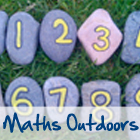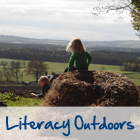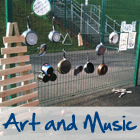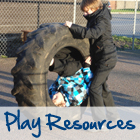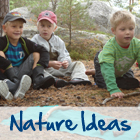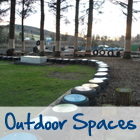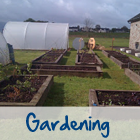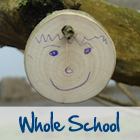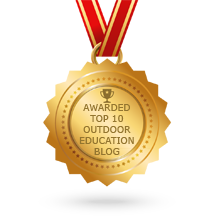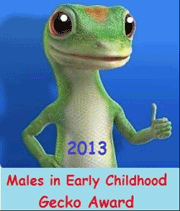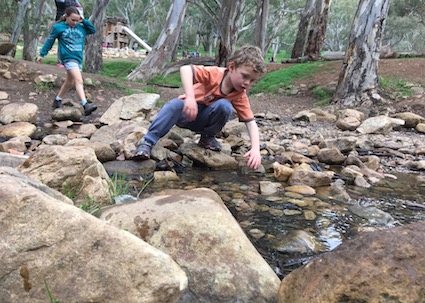
This section contains suggestions for experiences based around playing outside in natural spaces where children can enjoy playing and developing a love of the outdoors and nature that lasts a life time.
It is worth exploring other pages of the blog posts such as Developing Outdoor Spaces and Gardening. These contain posts that have strong connections to nature play and vice versa.
Outdoor Early Learning and Childcare
- Outdoor nurseries in Scotland. This is not a definitive list as it keeps growing all the time. Also I have added in examples of regular nurseries that have a strong outdoor ethos.
- Dunblane Nature Kindergarten – a transformation from traditional to nature-based practice. Manager, Steven White, took the staff on a journey to change the ethos and practice with very positive results.
- Cowgate U5’s Centre – come and look! A 2010 tour of this urban nursery with a strong nature based ethos and practice.
- The affordance of the big steps. Thinking about environmental features and how they add to an off-site nature experience for children.
- What do you seek in a wood for play? Children are drawn to naturally more adventurous spaces… let’s follow their lead.
- A Forest Kindergarten session. An older post from the original Scottish Forestry Forest Kindergarten pilot project back in 2012.
- Nature Nurture. A wonderful example of the therapeutic benefits of primary-aged children spending extended time in nature.
- Wild about this space. It’s not a wildlife area, woodland or garden… just a neglected patch of ground in a school that is much loved by children who visit weekly.
- Woods for Learning: St Mungo Primary. An example of how a primary school developed a local woodland for learning with the help of a local countryside ranger back in 2010.
- Free play at Broxburn OOSC. Wonderful example of primary-aged holiday club in the woods. Check out the nets.
Plants
- Dandelion play – 10 ideas. The joy of exploring the properties of a common wildflower.
- 10 outdoor ways to celebrate daffodils. Stories, explorations and ideas that help children enjoy daffodils. More than art and craft!
- Crocus reflections. A wonderful example from Cruickshank Botanic Garden to inspire you to create your own seasonal flower labyrinth and to consider what crocus represent.
- A snowdrop story – one I heard about years ago that explains why snowdrops are one of the first bulbs to flower each year.
- DIY clipboard flower press. A skinted not minted approach to drying flowers and leaves that uses just cardboard, kitchen paper and elastic bands. Clipboards are optional.
- Daisy footprints. A counting activity using the prevalence of daisies on a playing field.
- 10 ideas for playing in long grass. Every child needs a patch of long grass in which to play!
- Rainbow potions. Using flower petals and other parts of plants to make simple water colours.
- The beauty of bamboo. Examples of the versatility of this plant from Japan.
- Play stumps – one of the best play resources created by nature.
- Holly. The story of holly and some customs and traditions explained.
- Autumn wires featuring berries. Some suggestions for exploring autumn using berries and other found items.
- Autumn memory mobile. A reflective activity using free and found objects. Can happen anytime of the year.
- Death, decay and new life. A exploring life cycles outside in autumn using rosebay willow herb as a context.
- 6 games and top tips for playing with conkers. Designed for seasonal autumn fun. Hold your own conker championship!
- The art of plant study outside. A creative use of loose part resources to explore the different structures and functions of plants with a primary class.
- Plant ID in a parallel universe. Photo Booth comes alive using the mirror line function to make plant identification with a difference.
- 8 ways to re-use your Christmas tree. Practical suggestions to help make the most of a real Christmas tree.
Leaves
- Leaf play – 10 ideas. Very simple ideas for playing with leaves, ideal for linking to a relevant story or book.
- 2D shape art with leaves. Whilst the focus is maths, the clever use of cardboard and dried colourful leaves at the end of the post can be applied to all sorts of projects and concepts.
- Leaf roses. Whilst this feels like more of a craft activity, the art process comes through the exploration of different leaves and their flexibility and textures.
- Leaf art. Colourful ephemeral leaf creations inspired by a workshop run by Alain Kain.
- Exploding leaves. Yes! Creating artwork with a bang! Perfect for a Guy Fawkes related nature celebration.
- Developing thinking skills with leaves. Using leaves as a context for reflective and critical thinking.
- The black spot – pirate maths outdoors. Arr! Find me a sycamore leaf you landlubbers!
Sticks
- 10 little stick activities. A few ideas to remind you of the play potential of a stick.
- Sticks in schools. My first experience of introducing sticks to a Primary 1 class. Practical tips to consider.
- Making skeletons using sticks. Simple exploration of human anatomy, thanks to P7 teacher, Judy Duncan,
- A simple stick measuring game for little children. Great for assessing whether a young child understands aspects of length.
Animals
- We’re going on a bug hunt – minibeast magic. A helpful blog post covering the basics of organising a minibeeat hunt with a class.
- 15 minibeast outdoor maths challenges. Beastly fun going on a hunt for little creatures that help us understand maths in the world around us. This approach can be adapted to exploring other aspects of nature too.
- Stick insect symmetry – using sticks to create symmetrical insects. Surprisingly good fun. Use rainbow sticks to increase the challenge even more. Are all insects symmetrical in real life? Go on a mini beast hunt and find out.
- Seafood investigations. Exploring the carcasses of seafood to learn more about the structure and function of these amazing exoskeletons.
- Skulls and bones. A wonderful way of exploring nd understanding animals. One blog post well worth a look.
- Red squirrels. Feeding advice and explanations of why the UK is trying to eradicate the grey squirrel.
- Woozy wasps. A few stinging comments and some sensible advice.
Birds
- Ducks at The Coombes School. An example of how keeping poultry can be used for curriculum work.
- Feathers – 10 ideas. Simple suggestions and advice for gathering and using feathers outdoors.
- Creating bird friendly schools and nurseries. Some sensible, doable suggestions – a blog post co-created with an RSPB officer.
- A bird feeding garden – an example of a natural approach to feeding birds that makes the most of planting and natural features such as logs.
- 20 outdoor bird games and activities – lots to do outside when learning about birds.
- A Flock of Words – using public art as inspiration for bird quotes, jokes and sayings.
Snow, frost and ice
- Snow fun – 15+ ideas. Easy and doable but preparation is the key!
- 14 ways to enjoy ice and frosty weather outside. It may not be snowy but the frost could still appear.
- 10 ideas for mark making in the snow. Advance preparation is key. However the effort invested is worth it. Every snowy moment should be a celebration in the UK 🙂
- Let’s build an igloo – good example of an igloo tall enough for children to stand inside.
- Snow of wonder, snow of joy. How to make magic disappearing pictures using snow!
- Snow stencils and blood. Exploring patterns, splats and stencils in the snow.
- Adventure play in the snow – guest post by Frode Svane from Norway.
- 10 primary maths ideas that need snow. A few suggestions to make the mathematical most of a snowy day.
Other weather explorations
- 20 outdoor suggestions for rainy days. Essential for getting out in the UK!
- Rainy day rubbings. Switch to using tin foil and your children may do rubbings in any weather.
- 12 puddle play investigations. Great for enjoying a good splash and more outside.
- 10+ ideas for windy days. Lots to keep you going with the flow outdoors!
- The weather vanes of Nida. Beautiful local custom of having weather vanes that reflect local and family identity.
- Shadow play – 10 ideas for exploring moving and static dark spaces.
- Shadow explorations with an iPad. A curious discovery about one element of Photo Booth that lends itself to investigating shadows.
- 10 ideas for exploring clouds. Great fun and added value when using Photo Booth creatively.
Water
- A portable water wall – handy for settings that set up from scratch.
- Skitch those water wall designs. Using apps to annotate photos. Works well in a range of outdoor lessons and contexts.
- Developing a water play area. An example of one that takes account of Tom Bedard’s dimensions and elements so that it active engages children through open-ended explorations!
- Axioms of sensorimotor play. An illustration of some basic principles for the layout of a space and how to facilitate play in ways that keep children exploring, using water as a context. Based on the work of Tom Bedard.
- The “Sensori” water station. How to pimp play equipment and quickly create an engaging water play area.
- Rain chains. They can be functional or aesthetically arty. They can be bought or home-made. Useful addition to collecting water for re-purposing in your outdoor space.
- Dry creeks and streams. These can be high or low affordance, properly installed or a DIY construction. Lots of to think about but well worth it!
- Where water meets sand and rock. It is a liminal place where the most interesting play can happen but does require some planning and organising to ensure this works for your cohort of children.
- The science of a splat. Using water and rocks to undertake a fair test and scientific investigation.
Beach and sand
- The urban beach visits – one nursery’s experience of getting this going. Much of this was around building confidence of staff and children to explore.
- Beach play – 10 ideas. In the unlikely event that your children need some inspiration. Good for linking to a relevant text.
- Shells – 10 ideas. A few short, simple ideas for playing with shells on a beach.
- The sand dog sculpture – small is beautiful. Sometimes a bag of sand is all a group needs.
- Sandpits outside – challenging myths and misconceptions. The one stop shop for finding out about the ins and outs of having sand in a early years or school grounds. Also lots of examples of practice to give you ideas.
- The Highway Farm sandpit. An illustration of a creative self-build approach: different levels, mirrors, use of platforms and pulleys. Good for settings wanting to stretch the play possibilities.
- A tyre sandpit. *This was my first attempt at a pop-up sandpit. Whilst it looks good, there are lessons to be learned and one key one is active and ongoing management of the pit. Also I wouldn’t put soil and plants around the edges anymore.
- A recycled sandpit kitchen. *An example of a play space created through careful use and placement of unwanted home economics furniture – with due regard to checking and ensuring the safety of these to use in this context.
- A seascape to whet the appetite. As a result of the grounds developments, Inverallochy School children were inspired to give the school dining room a sea theme makeover – a lovely example of indoor/outdoor connections that can be made that involve the community too.
- Boggle Hole – Children need to have access to objects and ideas that spark the imagination and get the creative juices flowing. This Youth Hostel does just that!
Rocks, stones and pebbles
- 10 rock, pebble and stone play ideas. Everyone needs a rock to play with. What would you do with yours?
- 10+ ideas for using story stones outside. This is a mixed page with lots of suggestions for primary classes, not just early years.
- Big boulders: advice about sourcing, installing and exploring
- White line pebbles. Simple concept for adding interest to stones to focus on the pattern possibilities of lines. Inspired by one of Andy Goldsworthy’s pieces of art.
- Stones – thinking about stones and their education value.
- The place for stones – Cowgate U5’s Centre. An example of 0-5 nursery ensuring there are plenty of stones for all children to use outside.
- Geology at the Coombes School. For over a decade, a range of stones and geology features were thoughtfully collated and incorporated into this school grounds.
Mud
- 10 ideas for mud play. Perfect for celebrating International Mud Day, 29th June.
- What makes a brilliant mud kitchen? Have a look at this example which is the focus of a PhD study!
- An interactive palette play station. Creating an open-ended play feature, mainly from palettes at Stramash Fort William. Focus is mainly on mud and water.
Generic nature play posts
- Sobel’s nature play design principles in action. Example of how these principles could manifest outside.
- Nature Design Principles. A brief illustration of David Sobel’s principles. A useful planning tool for primary teachers as well as a way of assessing the play potential of any outdoor space.
- Backyard nature play – creative examples of how one family created a flexible play area using scrap bits and pieces.
- Make a wish for the New Year – a simple way for children and adults to express their thoughts and ideas.
- An outdoor memory game. Can be played with any free and found natural objects. Could also use flowerpots rather than toilet tubes.
- 10+ useful fiction books to support nature play and transition from nursery to P1. It can be useful to have a bank of books that you know work well in outdoor contexts and family packs.
- Nature mastermind – an old strategy game based on bulls and cows that is given a natural makeover.
- Hunting for gold. There’s treasure everywhere! Golden explorations of colour outside.
- The good, the bad and the fungi. Sensible advice about finding and using fungi and mushrooms with children.
- Forest School and Nature Pedagogy: Joining the Dots. Book review of The Essential Guide to Forest School and Nature Pedagogy. It’s THE outdoor book of 2021.
- Play in the dark – 20 Ideas to enjoy this special time.
A Swedish Skogsmulle Session
There are subtle differences between a Forest School session and a Skogsmulle session
Wild about this space
Play spaces of exploration, discovery and challenge.
A Forest Kindergarten Session
Give children the opportunity to experience a little wilderness.
What do you seek in a wood for play?
What features to consider in a wood for play purposes.
A Swedish Förskola
A photo tour of an outdoor nursery in Sweden.
Toulcuv Dvur Nursery in the Czech Republic
Best described as an urban environmental education centre.
Inside an Outdoor Pre-school in Sweden
It is interesting to see what the indoor space can look like.
Bringing nature into a Czech Nursery
Outdoor spaces in a Czech nursery school.
Mulleborg – an Outdoor Swedish Pre-school
Children spend 80% of their time outside, all year round – in ALL weathers!
Skogsmulle – Learning for All the Senses
History of Skogsmulle and I Ur och Skur pre-schools.
Woods for Learning: St Mungo Primary
Read, enjoy and be inspired to take your children to the woods this year…
The Place for Stones: Cowgate U5’s Centre
Beautiful stones in every nook and cranny!
Cowgate Under 5’s Centre – Come and Look!
Capturing the ethos and values of this city nursery.
Red Squirrels
Red squirrels can be the starter for lessons around biodiversity.
Making skeletons (using sticks)
This blog post is entirely inspired by Judy Duncan, a Primary 7 teacher at Kingswells Primary School in Aberdeen.
Nature Design Principles
Children from anywhere have play themes in common.
Sticks in School
Sticks are now a commonly used resource in many schools.
Sea Glass
Sea glass is broken glass that has been tumbled about by the water, waves and sand.
The Good, the Bad and the Fungi
It’s that time of year when fungi pop up everywhere!
Nature Nurture
Sometimes there are days that I wish would never end.
Ducks at The Coombes School
Learning about animals and life cycles.
Death, decay and new life
Autumn – the dying season – is beautiful.
Snow of wonder, snow of joy!
Snow provides fantastic learning opportunities.


